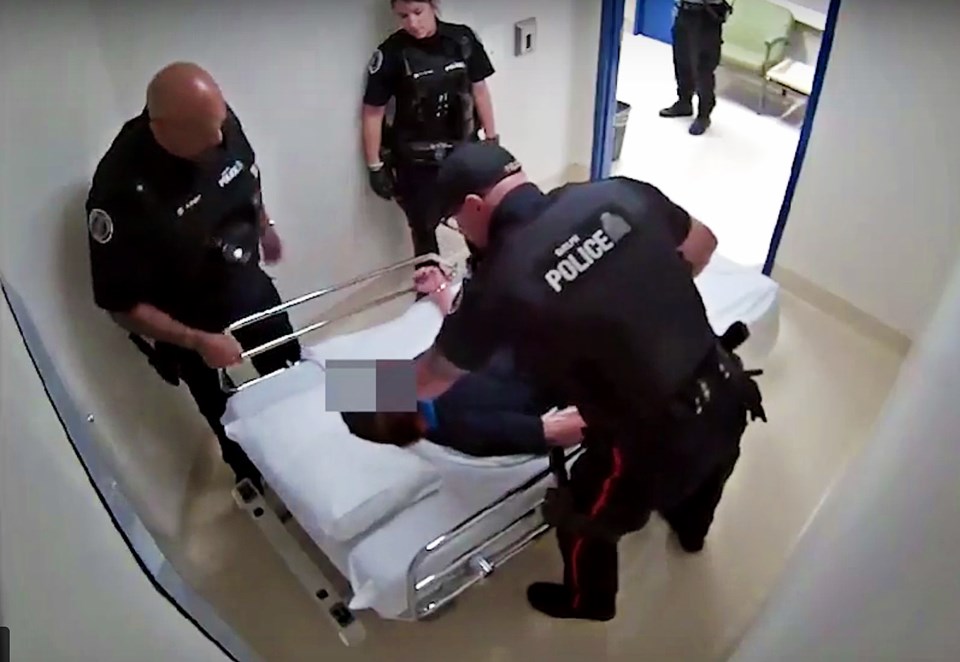Twice convicted of assault while on duty, a Guelph police officer must lose his job – there’s no way around it, argued lawyers for Guelph Police Service (GPS) during an appeal hearing held Tuesday as Const. Corey McArthur looks to overturn a disciplinary decision that he quit or be fired.
The appeal was heard virtually, in front of a three-member panel of the Ontario Civilian Police Commission (OCPC). No decision has been delivered at this time and no timeline for one was provided during the hearing.
The disciplinary decision was handed down nearly a year ago, following a years-long process related to McArthur’s attack on a teenager handcuffed to a bed at Guelph General Hospital in 2016.
“I urge you to boil this matter down to its most basic facts: A police officer, whom is trusted with protecting the public and particularly its most vulnerable members, has now twice been convicted of criminal assault in situations where he is deemed to have been reactive, aggressive, easy to anger and he abused his authority and the public’s trust,” said GPS lawyer Jessica Barrow, who referenced McArthur’s first assault conviction in 2008.
“He did not learn from his behaviour, rather, he egregiously assaulted a helpless youth in distress.”
Video of the 2016 incident, taken from hospital security footage, has been viewed tens of thousands of times online. The first thing GPS lawyers did during Tuesday’s hearing was play a portion of it for the appeal panel.
“Anything short of the officer’s termination would be appalling to those community members who have seen the video and have felt that their trust and safety have been violated by Const. McArthur,” said Barrow. “We urge you to uphold the officer’s termination.”
McArthur is asking the OCPC to overturn the decision of disciplinary hearing officer Terence Kelly, a former York Regional Police deputy chief, and let him keep his job.
In reaching that ruling, Kelly made a series of errors, McArthur’s lawyer, Joseph Markson, told the panel. Chief among them was the decision to allow GPS lawyers to reopen their submissions and present evidence regarding two unrelated judicial decisions that were critical of McArthur’s actions and testimony.
Markson noted McArthur was not charged or accused of wrongdoing in those incidents, and was cleared through an internal review in at least one of the cases.
He argued the judges' allegations were not tested in court and no evidence to support them was presented during McArthur’s disciplinary hearing.
“He wasn’t being tried for that allegation,” Markson noted. “Who knows how that would have been defended.
“You can’t rely on it as if it was the product of due process. It wasn’t.”
To allow comments from those judges to be considered is akin to admitting disparaging social media posts about police officers into evidence, Markson said. And if that’s the case, so too should be positive comments.
“We can all jump down this rabbit hole together,” he said.
In response, GPS lawyers pointed out the judicial comments were not submitted as proof of McArthur’s wrongdoing but rather in support other evidence to establish a pattern of behaviour.
What establishes that pattern, the panel heard, is McArthur’s 2008 conviction for assault while on duty, combined with the 2016 attack, and his employment record that shows he was cautioned about his use of force.
After pleading guilty, the constable received an absolute discharge for the 2008 incident – McArthur struck and illegally arrested a person who was critical of his behaviour during an incident in the downtown – and was subsequently docked 10 days pay as a result of the Police Service Act charges that followed.
McArthur also faced a private citizen’s charge of assault causing bodily harm in 2012 that was later dropped.
Markson also argued Kelly didn’t give enough weight to McArthur’s diagnosis of post-traumatic stress disorder and years of treatment.
Even if the OCPC finds Kelly erred in how he reached the decision to dismiss McArthur, there’s no other reasonable conclusion to draw from the facts of the case, said GPS lawyer David Migicovsky.
“There is no doubt that a criminal assault upon a vulnerable person is at the high end of seriousness. And there is also no doubt that the damage to the service in this case was very extensive,” he told the panel.



